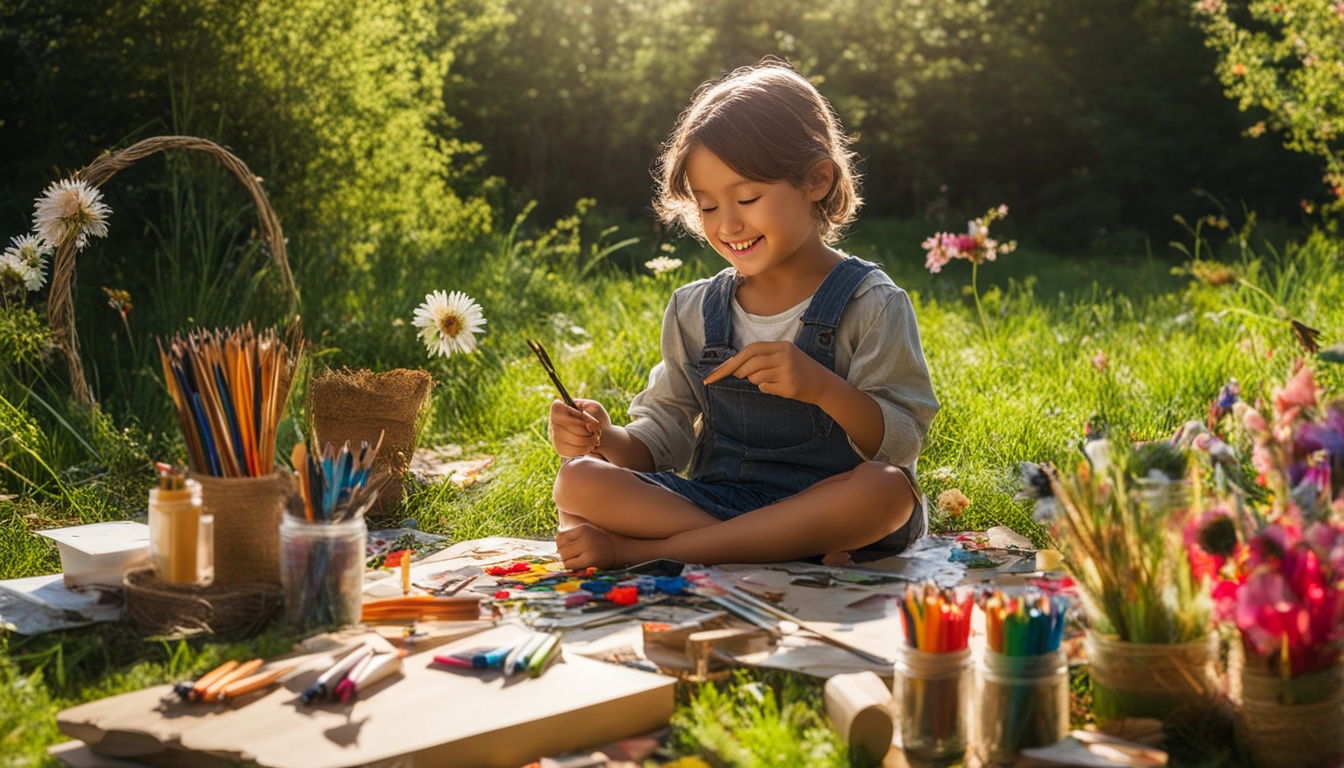Do you remember the joy of daydreaming under the summer sun or building castles with cardboard boxes as a child? Those moments were key to building your creativity. Today, with busy schedules, it’s hard to give kids the same freedom to play and be creative. Finding the right balance in Parent-Child Communication and Positive Parenting is crucial to support Child Development Milestones without over-scheduling.
The American Academy of Pediatrics says too many activities can make kids anxious and less motivated. Experts like Dr. Tim Elmore say downtime is important for imagination and solving problems. As parents, you might want to fill your child’s days with lots of activities. But giving them time to play freely can boost their creativity and emotional smarts, following positive child development ideas.
Adding free time to their day lets kids explore, dream, and make things from nothing. This unstructured play helps them grow their creative skills, as Dr. David Elkind explains. By choosing flexible toys, playing with them, and setting aside time for creativity, you’re not just filling time. You’re building a strong base for your child’s future.
Key Takeaways
- Over-scheduling can overwhelm children, impacting their emotional and mental health.
- Providing materials and tools can enhance a child’s creativity.
- Collaboration with others can significantly boost creative development.
- Encouraging children to share ideas fosters creativity and communication skills.
- Creation of a budget for projects helps children stay organized and focused.
- The CDC recommends limited screen time to promote healthy development.
- Promoting creativity can improve emotional intelligence and reduce stress.
Understanding the Pitfalls of Over-Scheduling
Many parents today over-schedule their kids. They sign them up for many activities, like hockey, ballet, piano, and soccer. Pediatrician Dr. Deb Lonzer says it’s key to balance. She suggests picking the top three activities for each child to make the schedule fun and doable.
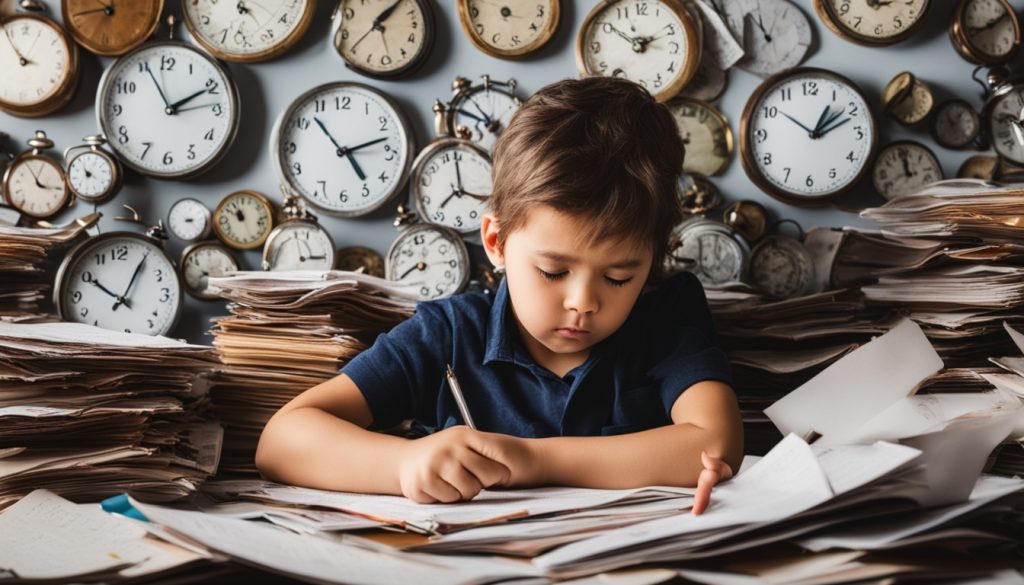
Impact on Emotional Intelligence and Mental Health
Too many activities hurt Emotional Intelligence in Children by cutting down on free play. The American Academy of Pediatrics says too much planning can make kids anxious and stressed. This hurts their mental health. Tim Elmore’s “Generation Z Unfiltered” agrees that a busy schedule can make kids feel less capable and responsible.
It’s important to have downtime, turn off electronics, and spend time together as a family. These steps help lessen the bad effects of over-scheduling.
Reduced Opportunities for Free Play and Creativity
Over-scheduling cuts down on free play, which is key for Building Self-Esteem in Children. Free play boosts creativity, social skills, and problem-solving. But, more structured activities mean less time for this important play.
Parents should mix structured activities with free play to help their child’s Emotional Intelligence and well-being. Letting kids explore and play freely is a good way to fight the effects of over-scheduling.
Managing screen time is also crucial. It’s not just about physical activities. Dr. Lonzer says to turn off all electronics during downtime to encourage kids to play, relax, and spend time with the family. Making time for family activities and outdoor play is key for a balanced life for kids and parents.
The Importance of Boredom in Creative Development
Embracing boredom is key to your child’s creativity and well-being. With kids often busy with many activities or sports, it’s crucial to balance their time. Setting boundaries and encouraging hobbies helps in nurturing their creativity.
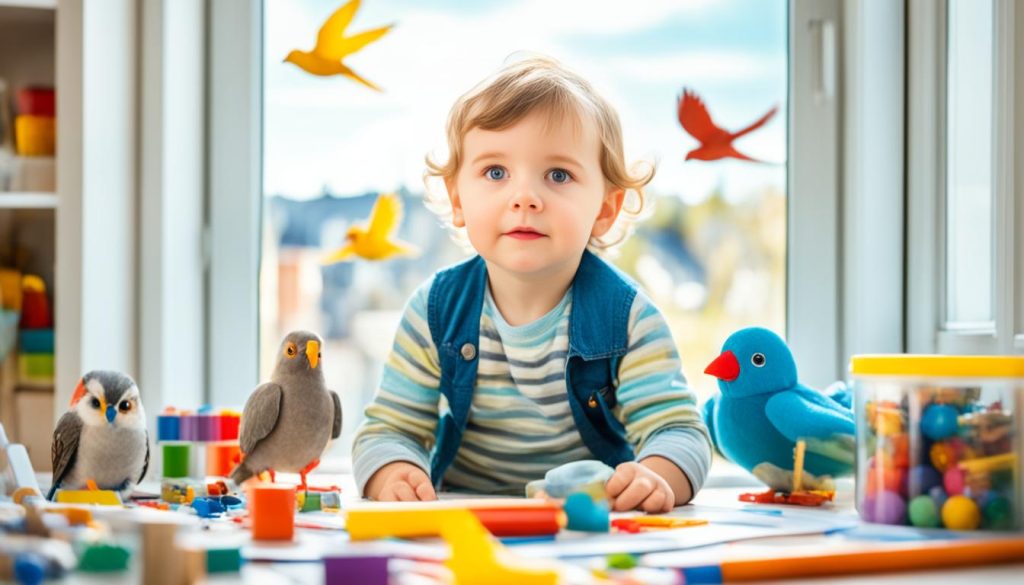
Fostering Unstructured Play
Unstructured play is vital for kids’ development. It lets them use their imagination freely without a schedule. This kind of play helps them invent games and solve problems, boosting their skills.
Julie Bogart, from “The Brave Learner,” recommends a creativity station with easy-to-get supplies for free play. Use art supplies, blocks, and costumes to spark their creativity. This way, they can turn boredom into a chance for discovery and self-expression.
Encouraging Imagination and Problem-Solving Skills
Unstructured time boosts imagination and problem-solving, important for kids. When left to themselves, they learn to think on their own. Studies show that boredom leads to deeper creative work later on. This creativity can heal and build confidence in kids.
Parents should make sure their kids aren’t too busy. Offering choices like reading, drawing, or building makes free time less scary. Setting boundaries means giving them space to explore safely, aiding their healthy growth.
Choosing the Right Toys and Materials
Choosing toys that boost creativity is key for Child Social Skills Development. It’s important to pick toys that help kids grow their Growth Mindset. Open-Ended Toys are great because they let kids use their imagination in many ways.
Open-Ended Toys vs. Pre-Programmed Toys
Open-Ended Toys are great because they let kids play in many ways. Things like blocks and Legos let kids build anything they want. These toys help kids think, solve problems, and be creative, which is good for their Growth Mindset.
Pre-programmed toys have set ways of playing and don’t let kids be as creative. Even if they teach things, they can limit play. For example, toys that make sounds and move on their own can stop kids from thinking for themselves. This can hurt their Child Social Skills Development.
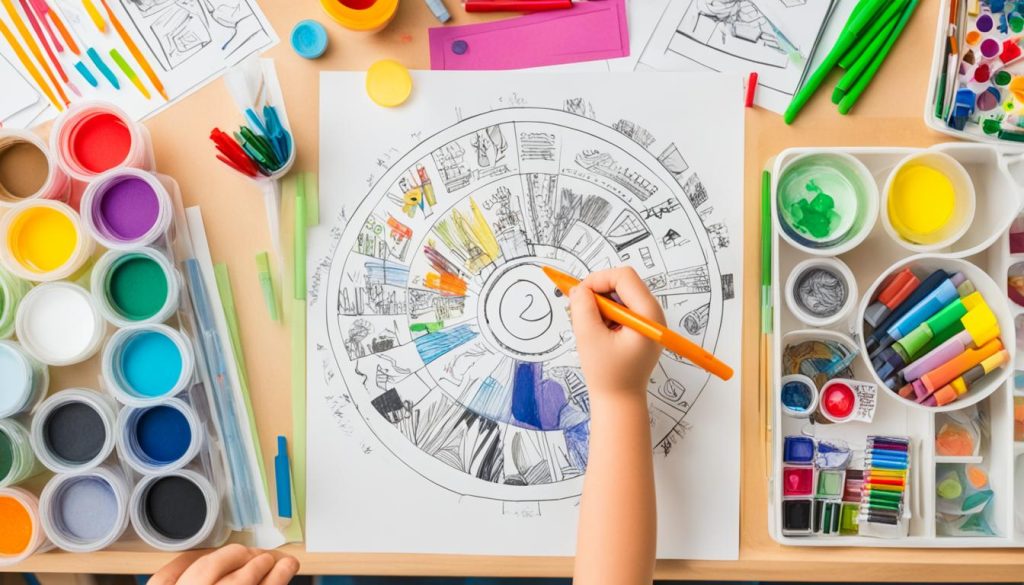
Examples of Creative Play Materials
Many things around the house can help kids be creative. Things like wooden spoons, cardboard boxes, and old fabric can start new kinds of play. The American Academy of Pediatrics says these everyday items are great for creative play.
There are also toys that help with different skills:
- Dramatic Play: Costumes, puppets, and playhouses help kids play roles and understand social stuff.
- Small Object Play: Puzzles, beads, and LEGO bricks improve fine motor skills and help with math and science.
- Art Play: Crayons, paint, and clay let kids express themselves and be creative, building a strong Growth Mindset.
- Physical Play: Balls, tricycles, and jump ropes make kids fit and coordinated.
- Game Playing: Board games and card games teach social skills, teamwork, and how to handle winning and losing.
When picking toys, safety is key. Look for toys that last, don’t have harmful paint, and don’t have small parts or loud noises. Avoid toys that do things for kids or promote bad habits. This helps make sure kids have safe, fun play that helps them grow.
Nearly 70% of parents have bought toys that kids lose interest in quickly. Open-Ended Toys keep kids engaged and help them grow.
| Recommendations | Benefits |
|---|---|
| Open-Ended Toys like Legos | Encourages creativity and problem solving |
| Everyday Objects (e.g., cardboard boxes) | Sparks imagination at low cost |
| Art Supplies | Promotes self-expression and fine motor skills |
| Physical Play Toys | Enhances physical skills and coordination |
| Board Games | Develops social skills and logical thinking |
Positive Parenting Strategies to Encourage Creativity
Using Positive Reinforcement Parenting can boost your child’s creativity. This method creates a caring environment and helps your child grow on their own. It turns mistakes into chances to learn and grow. This way, it teaches kids to solve problems and take responsibility.
Studies by the Positive Parenting Research Team at the University of Southern Mississippi show great benefits. Positive reinforcement helps kids do better in school, feel better emotionally, and handle tough times. The Gottman Institute also suggests a program to improve kids’ emotional smarts and happiness. These methods help kids be more independent and creative.
It’s key to create a space where kids can freely explore their creativity. Setting clear, positive rules helps them know what’s okay. Letting them lead in their projects and supporting them without controlling them is important. This balance lets them be creative and feel responsible.
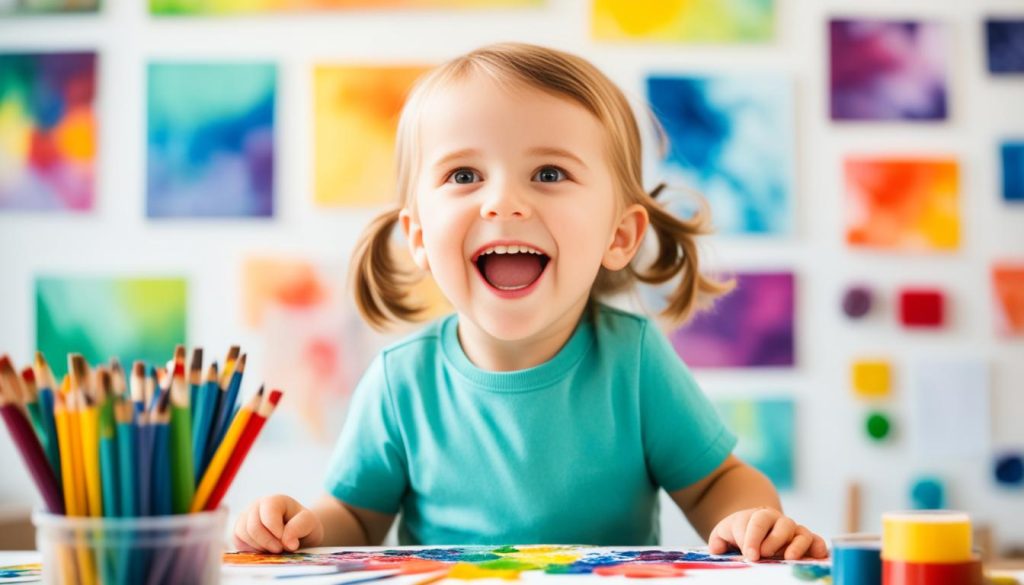
Supporting your child’s creative efforts can make them more original. Encouragement and emotional support, along with patience, boost their confidence to try new things. Research from Bath Spa University shows a big jump in positive behavior and well-being in kids who learn emotional coaching.
Having a routine with various activities can spot and grow a child’s creative talents. Reading, exploring different cultures, and going to museums can widen their imagination and social skills. These activities give them new ideas and help them think creatively on their own.
By using Positive Reinforcement Parenting, you’re not just boosting your child’s creativity. You’re also teaching them to be independent and responsible. These methods help raise kids who can face challenges creatively and responsibly.
Creating a Dedicated Space for Artistic Exploration
Creating a space for art is key to boosting child creativity. It lets kids use their imagination and share new ideas. Having an art station also brings parents and kids closer through teamwork and shared fun.
Designing an Accessible Art Station
Setting up an art station means organizing materials well and placing them right. This helps kids be creative and independent. Montessori moms share great tips on making these spaces at home:
- Use Jar Melo washable markers, Honeystick crayons, and Stabilo woody color pencils for easy access.
- Put an IKEA flisat table and a trolley cart with art supplies nearby.
- Keep a few, high-quality art materials to keep kids interested and avoid frustration.
- Offer different play activities since kids’ interests change every day.
Adding a waste basket and teaching the ‘Keep / Display / Recycle’ rule helps keep things tidy. For more tips, click here to learn about child dynamics and supporting their unique qualities.
Keeping Supplies Organized and Inviting
It’s important to keep art supplies tidy for a welcoming space. Here are ways to do that:
- Put supplies in containers or trays for easy reach.
- Show kids the value of putting things back after use to teach responsibility.
- Reuse paper scraps for future projects to reduce waste.
Showing off kids’ art can boost their confidence and inspire more creativity. Keep some art in a sketchbook and display special pieces. Reintroduce art supplies that were once misused when the child is ready again. This way, you keep creating Designing Creative Spaces that meet their changing needs.
For more Montessori tips on encouraging creativity in kids, check out Momtessori Life and How We Montessori.
Parenting and Raising Kids with a Focus on Creativity
Putting creativity at the heart of parenting brings big benefits for kids. It helps them express themselves better, see things from different angles, and learn important social skills. This way, kids grow not just in their minds but also in their love for learning throughout their lives.
Recent stats show 67% of parents want to break the cycle of negative parenting by talking more and feeling closer to their kids. Creative activities are a great way to do this. They teach kids to be independent and make their own choices, which 80% of parents see as key.
Teaching kids to be thankful can also be part of creative projects. When kids work on projects that make them thankful, they learn to appreciate more. This helps them get better at social skills, which 35% of parents focus on.
Studies link parental warmth, rejection, and creativity closely together. Different parenting styles affect how creative and confident kids become. Supporting your child’s creative side helps them grow emotionally and mentally. For example, when moms support kids in solving problems, it helps kids think more flexibly.
Many parents, 58%, want their kids to be creative and independent. By adding creative activities to parenting, kids do better emotionally, socially, and in school. This focus on creativity makes kids who can express themselves in unique ways.
Knowing these points and using them in parenting can make a big difference. It helps kids become well-rounded and good at social skills.
Making Peace with the Messiness of Creativity
Creativity often brings chaos, but it’s key to your child’s growth. As a parent, it’s tough to balance letting your child play freely and keeping your home tidy. This is true when you’re busy with work and family or homeschooling several kids.
Managing Cleanup While Encouraging Free Play
It’s important to keep your home clean while supporting your child’s creativity. If you’re too busy, think about getting cleaning help. Pick the most important cleaning tasks to keep your home basic clean. Teach your kids about sharing the cleaning duties to help them develop good habits and resilience.
Let them help with simple cleaning tasks during their play. This not only keeps your home neat but also helps your child learn to organize and be responsible.
Highlighting the Joy in Creative Messes
Find the joy in your child’s creative messes. These moments show they’re exploring, learning, and growing. They’re crucial for teaching kids to be curious and solve problems. It’s key to set limits without stopping their creativity.
Being understanding and calm when dealing with messes helps strengthen your bond with your child. This approach reduces fights and tantrums.
Here is a comparison of approaches to handling creative messes:
| Approach | Impact on Kids | Impact on Parents |
|---|---|---|
| Setting Strict Limits | Limits creativity, leads to power struggles | High stress, strained parent-child relationship |
| Encouraging Shared Responsibility | Builds self-discipline and resilience | Lowers stress, strengthens bond |
| Ignoring the Mess Entirely | Lacks discipline, possible behavioral issues | Overwhelming chaos, increased stress |
Make sure one room is always tidy for yourself. This helps with your mental clarity and balances work and family life. Accept the mess as part of creativity. Watch your child flourish in a supportive environment.
Joining Your Child in Play and Creative Activities
Playing with your child can make your bond stronger. It lets you dive into their world. This way, you create a caring space for both talking and playing together.
Following Your Child’s Lead
Letting your child lead in play is key to a strong bond. It teaches them respect and empathy. It also makes them feel confident in their play.
The Benefits of Shared Creative Time
Studies show kids do better socially when parents play with them. Play turns whining into laughter and makes transitions easier. It’s a way to reduce stress and connect after a long day.
Activities like drama, music, and art boost creativity and social skills. They help your child grow in a supportive space. This approach builds respect and empathy in your family.
Incorporating Art and Creativity into Daily Routines
Adding art and creative activities to daily life lets kids express themselves freely. Family Traditions and Rituals that include making art help kids build good habits. These Daily Creative Habits boost their thinking skills and teach them important lessons in a fun way.
Arts and crafts during meals can teach kids a lot. They learn new words and ideas about their art. At bedtime, stories and drawing can spark their imagination and help them relax and think deeply.
Art helps kids develop their hand skills too. Using crayons and brushes strengthens their hands for writing and other tasks. It also helps them understand shapes and sizes, which is good for math.
Art routines support kids’ growth and make their days predictable. Teaching kids manners through art is a smart way to teach values. Art lets kids safely share their feelings and handle their emotions.
It’s important to focus on the process of art, not just the end result. Letting kids choose their materials and follow their interests boosts their motivation. Books like “The Art Playroom” and “The Artful Parent” give you tips and projects to help your child’s creativity.
Combining art with daily life helps kids grow fully. It teaches them to value both beauty and learning in their lives.
Conclusion
Raising kids in today’s digital world means helping them grow creatively. By avoiding too much scheduling, you make room for their imagination to flourish. Letting them face boredom is key, as it boosts their creativity and problem-solving skills.
Choosing toys that encourage exploration and creativity helps too. These toys give your child many ways to play and make things. It’s also important to spend time with your child, making art together and playing with them.
Studies show that how parents act affects their kids’ personalities. For example, a 2021 study found that parents’ actions shape traits like being careful and friendly. Having routines that are both structured and flexible helps your child grow. This prepares them for school and life’s challenges.
Talking to your child about big topics like racism and bullying is also key. These talks help them understand feelings and social norms. By doing this, you’re not just getting them ready for school. You’re giving them skills for life and helping them handle tough times.
For more on helping your child, check out resources on spotting early signs of learning issues and how to help here.
FAQ
How can I support my child’s creativity without over-scheduling?
What are the pitfalls of over-scheduling my child?
Why is boredom important for my child’s creative development?
What types of toys best support creative development?
How can positive parenting strategies encourage creativity?
How do I create a dedicated space for my child’s artistic exploration?
How can focusing on creativity benefit my child’s development?
How can I manage the messiness that comes with creativity?
Why is it important for parents to join in on their child’s creative activities?
How can I incorporate art and creativity into daily routines?
This post contains affiliate links. If you click on a link and make a purchase, I may earn a small commission — at no extra cost to you. Thank you for supporting this blog and helping me keep the patterns free! Read the full Affiliate Disclosure & Transparency.
